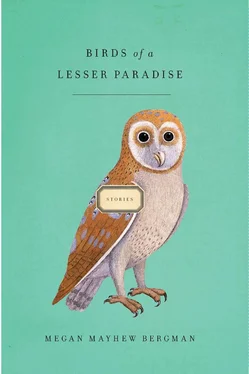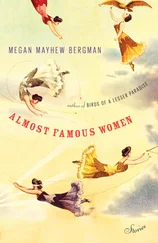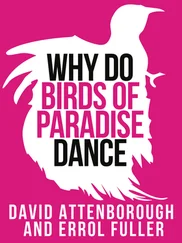Jesus greets me as I let the other goats into the milking stanchions; she didn’t kid this year and has no milk. You can’t hold her in; she is an escape artist of the highest caliber. She will climb over and bite into anything. I do my best to pen her up with the others — there are coyotes everywhere around here — but she always gets loose. If goats could remember anything, she’d stay inside. There’s a reason her ears look moth-eaten.
One night, last spring, after a late snow storm, I came in to find a stall full of blood. Chamomile hovered over her kid in the corner. In front of them, ears and neck ripped to shreds, was Jesus, who had found her way out of the large pen and put herself between the kid and the wild dogs.
Pete had wanted to put her down, but I gave most of the cash I had on hand to the vet, who cleaned and sutured her wounds. She spent a few nights in my room (wearing adult diapers) until she healed.
Hey Jesus, I say, scratching underneath her white chin. She nuzzles into my side.
I don’t have to coax the goats into the stanchions; they are full and ready to be milked. I put some feed in the trays where their heads go, and we fall into our habit. After two hours in the barn, I head back to the house, but I can hear Willow and Pete arguing in the kitchen.
The garlic is just another example, Pete says.
Of what? Willow says. Why are you so hard on me?
No one’s hard on you, Pete says. You set yourself up.
For what?
You dream big and never see things through, he says. You make a mess and expect—
I don’t expect anything!
I decide to ride my bike to the country store for coffee. I always experience the landscape differently on my bicycle. In a car you only get an impression of the countryside, like a de Kooning canvas of a woman: you think she’s naked, and you know she has eyes. On a bike, everything is Sargent: real, but soft and dreamlike, a prolonged glance.
As I pedal up the hill, past an abandoned farm where an artist used to live, I notice the roof of his old barn giving way. He was an average painter, but like many of us believed he possessed above-average talent. So he converted the barn into a museum dedicated to his own work. The windowpanes are cracked and the sign bearing his name has faded.
Hours later, Pete and Willow are fighting again. After running errands and doing chores, I can hear them screaming at each other before I even go inside. There’s no way to get to my room without passing them.
I walk to the barn to make sure water buckets are full and everyone is locked up for the night. Jesus is out in minutes, trailing me as I take buckets from spigot to stall.
Buzz comes in. That goat thinks you’re her mother, he says.
I might as well be, I say. Looking for something?
Just trying to keep busy, he says. My car keys are in the damned house.
Take my truck, I say. I don’t need it.
No, he says. I couldn’t.
I throw the keys at him. He nods. I know it will be back in the driveway by 6 A.M. with gas in the tank, or washed.
We could say more, but you get used to a place. I don’t want my life to change yet; what I have here is probably better than most of my other options. I like the goats and the wallpaper in my bedroom, the soft mattress and big windows, the horsehair stuffed into the cracks of the plank floors. I’ve tacked Jack Yeats prints to the ceiling because the colors and shapes are what I want to see in my dreams. Here I have nothing but myself, my job, and a free meal. There is no mortgage, no husband, and in the middle of seventy acres, the real world is at arm’s length.
That night, Willow comes into my bathroom in one of her nightgowns, a skinny farmgirl in a cotton doily. Her toenails are bright red. She tosses her wet hair over one shoulder and wrings it like a mop. She stands next to me and we look at our reflections in the mirror while I brush my teeth.
I think we’re going to try for a baby, she says.
• • •
Mom’s family has a theory about the color of my hair.
Last Thanksgiving Mom’s sister Ellen and I gathered at Mom’s place. There was a light, early snow on the ground. The radiators in the small house had kicked on. Ellen dumped maple syrup into her coffee and sat down at the table.
Your mom’s first husband was a redhead, Ellen said, eyeing me over a green bean casserole.
What? I said.
Mom snorted and nibbled on a piece of Brie.
You know I’m right, Ellen said, staring into my mother’s eyes. He came to visit you, didn’t he, before you ran off with what’s-his-name?
I put my fork down. Is that true? I asked.
No one knows anything, Mom said, swigging Chablis. She turned to watch the home renovation show she’d left running during our meal. Her hair had grown out. There was an inch of artificial red hair beneath her chin, strands of silver above.
The first person I ever loved sent me to a hospital for months of electroshock therapy, Mom said.
I can’t compete, I said. I know.
You should be glad your father left, she said. I am.
Is Aunt Ellen telling the truth?
Count on it, Ellen said.
He was sleeping whole days away on benzos, Mom said, waving her hand as if she could cast the thoughts of Dad aside.
Know what your mother told us when she ran off? Ellen said, turning to me. Everyone deserves to be happy.
See how happy I am? Mom said, chewing on a little bit of rind. Laughing, she turned back to the television, her eyes drawn to the artificial light.
Fifteen years ago, in this very room, we undertook the monthly ritual of coloring Mom’s hair, taking locks of it in our fists and plunging it into the homemade dye, turning it from brown to red, staining our fingers. I was part of the ruse and didn’t know it.
Those days Mom and I touched each other without thinking, shared sandwiches and Cokes, crawled underneath the sheets together during thunderstorms, piled into the truck and fought like wolves over my father’s homemade French fries, sang our hearts out to The Band. We dyed wool for her weaving projects, braided garlic, took morning walks in the wet fields.
But I don’t know this woman anymore.
I stood up from the table.
Where are you going? she asked.
I’m due back at the farm early tomorrow, I said. Might as well head out now.
So soon? Mom asked, but the concern in her eyes was quickly replaced with fatigue. She was washed out, drained of color and feeling. I imagine it is one of the great sorrows of her life that she is easy to leave.
The truck bumped and skidded over the dirt roads. I kept an eye out for deer and moose and wondered: how is it possible we so easily outlive our usefulness to one another?
• • •
The next morning, as I walk to the barn, Pete is circling the farm on his four wheeler. Buzz holds Willow by the elbow to show her the new fencing he has installed, which he says will be good enough for llamas. Unlike Pete, he is down with the long-term plan.
Jesus is on her front knees in the pasture, chewing dandelions. Just as I reach the barn, Pete pulls up behind me. His engine sputters in neutral.
Bus gets in soon, he says. I looked at the stock. We don’t have enough fudge.
I made one per person, I say. I figure some will buy two, some none.
We need a big sale, he says.
Before I can make a case for myself, Pete begins pulling molds out of the cabinets. I don’t like the way he’s doing things but he owns the barn we’re standing in, the cheese, the molds.
I like to do it this way, I say, showing him how I smooth the flower petals out before filling the mold.
Mhmm, he says, jamming the curds into a cup.
Unfortunately Pete is industrious, and makes twenty odd-shaped rounds in minutes. He wraps them messily and throws them into a basket.
Читать дальше












